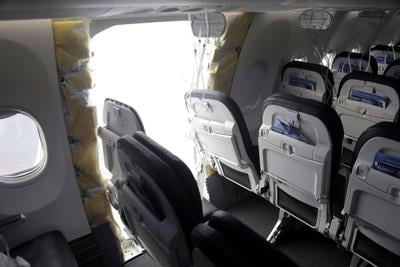MONTREAL - Canadian air travellers will be largely unaffected by the grounding of Boeing's 737 Max 9 airplane, but they may want to double-check their itineraries nonetheless.
Some passengers could be booked on routes disrupted by the U.S. Federal Aviation Administration (FAA) order, which grounded the Max 9 after a panel tore away from the fuselage of an Alaska Airlines plane Friday, leaving a refrigerator-sized hole in the cabin wall and prompting an emergency landing. No one was seriously injured.
The grounding left nearly 200,000 passengers facing cancellations on two major airlines south of the border Saturday through Monday, with 171 planes temporarily barred from takeoff.
Boeing's shares dipped 8 per cent on Monday to close at US$229.
No Canadian airlines operate the Max 9, but some of the big carriers have partnerships with Alaska Airlines and United Airlines, which include the medium-range narrow-body jets among their fleets.
Alaska has 65 Max 9s — 28 per cent of its fleet — and United has 79, or eight per cent of its plane tally. Canadians routinely board some of those planes on connecting flights.
WestJet and Alaska have an interline agreement, allowing travel across different networks on a single reservation. Air Canada and United have a codeshare deal that lets passengers book trips with either carrier to about 50 destinations in the U.S. and Canada, with hundreds of flights per day.
United said it expected to cancel 200 flights on Monday alone, and hoped to rebook passengers on other trips.
You might be interested in
"We’re continuing to avoid some cancellations by using other aircraft types whenever possible," the airline said in an email.
The scale of the network disruption will hinge on whether the problem is a one-off or the result of a systemic flaw, said John Gradek, who teaches aviation management at McGill University.
"If it’s systemic across the Max 9 fleet, this could take a while," Gradek said, with tough repercussions for carriers that depend on the jet.
“This airplane’s a workhorse for Alaska."
Alaska Airlines cancelled nearly 22 per cent of its flights Saturday through Monday and United cancelled nearly nine per cent over the past two days, according to tracking service FlightAware. The figures currently put the airlines in the top two spots for cancelled flight percentage in the U.S. and Canada, amounting to more than 1,100 cancellations as of Monday evening.
TD Cowen analyst Helane Becker said they will continue until at least midweek.
"To state the obvious, not everyone will be re-accommodated on Alaska, United or Copa" — whose 29 Max 9s make up 30 per cent of the Panamanian carrier's fleet — Becker said.
"January is generally a relatively slow month for the industry, and the fact this happened after the holidays is annoying but less impactful," she said.
All 171 of the grounded planes in the U.S. will have to pass inspection before they can return to the skies, the FAA said Saturday.
The grounding marks another hit against Boeing's reputation after the more widely used 737 Max 8 airliner was grounded for 20 months, costing the U.S. jet maker billions of dollars and raising questions about its reliability.
Aviation authorities across the globe issued directives in March 2019 after a deadly crash that killed all 157 people on board an Ethiopian Airlines flight in the second of two Max crashes less than five months apart. The aircraft contained critical flaws in its MCAS anti-stall system that could plunge it into a nosedive if a sensor failed.
"People should be concerned about the Boeing culture," Gradek said. "Boeing had an excellent reputation for delivering 100 per cent safe airplanes. However, that reputation is starting to be tarnished."
He suggested that the company's recent problems may stem from its decision to keep rolling out new planes based on updates to a 55-year-old design, rather than starting afresh.
"This has been Boeing's strategy of late — if it ain't broke, why tinker with it," Gradek said.
"This was a strategy by Boeing not to spend any money doing what I call a 'blank-piece-of-paper airplane,'" which requires a greater investment of time and cash, he added.
A string of smaller quality control issues have hampered the Virginia-based giant's progress in recent years. The latest surfaced less than two weeks ago, when Boeing urged airlines to inspect all Max planes for a "possible loose bolt" in the rudder control system, according to the FAA.
No Canadian airlines have Max 9s on the order books, but at least one has its sights on the not-yet-certified Max 10. WestJet announced in 2022 it would buy 42 of them, with an option for 22 more.
"There's concern on the Maxes. The Max 10 has been awaiting certification, and there's no end in site," said Robert Kokonis, president of consulting firm AirTrav Inc.
"This has a major impact on airlines to deliver the network plan that they've budgeted for," he said. "If you don't have the airplanes in place to fly, it could be a material dent in the earnings and bottom-line profitability."
For the Max 9, the airframe design itself is likely not the source of the issue, Kokonis said.
"It could be the manufacturing or assembly," he said, adding that maintenance can also likely be ruled out, given the planes only began to enter service in 2018.
The 13 carriers that fly the Max 9 include Turkish Airlines, Aeromexico and Icelandair. Alaska and United account for about two-thirds of the planes in service globally.
This report by The Canadian Press was first published Jan. 8, 2024.













Anyone can read Conversations, but to contribute, you should be a registered Torstar account holder. If you do not yet have a Torstar account, you can create one now (it is free).
To join the conversation set a first and last name in your user profile.
Sign in or register for free to join the Conversation